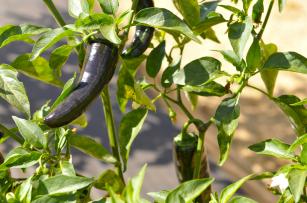Improved means of subsistence for smallholder pepper growers through partnerships that aim at germplasm improvement and adaptation
Improved means of subsistence for smallholder pepper growers through partnerships that aim at germplasm improvement and adaptation

Photo: BENCHEKCHOU, Zineb
Smallholder Capsicum pepper growers in Uganda are operating below the ideal levels of agricultural production due to a lack of improved varieties, low quality seed systems and the devastation caused by pests and diseases. The damages caused by diseases are aggravated by the cultivation of susceptible germplasm and the use of poor quality seeds. In order to increase production and competitiveness in the market, farmers need to have access to clean seeds of cultivars that are tolerant to diseases and adapted to local agroecological conditions. Little research has been made in Uganda to improve pepper seed production systems and select germplasm adapted to the country, important points to improve the performance of the sector. There is also a need to establish platforms to agregate all the segments of the Capsicum pepper production chain in a participatory approach to promote the sustainability of the sector. This project aims at gathering efforts at national level and in collaboration with Brazil to enrich Capsicum germplasm with a special focus on assessing resistance to pathogens, agronomic traits, and palatability, with the participation of researchers, small-scale pepper growers, extension workers and other stakeholders in the production chain.
Ecosystem: Cerrados Region
Status: Completed Start date: Mon Jun 01 00:00:00 GMT-03:00 2015 Conclusion date: Thu May 31 00:00:00 GMT-03:00 2018
Head Unit: Embrapa Vegetables
Project leader: Claudia Silva da Costa Ribeiro
Contact: claudia.ribeiro@embrapa.br
